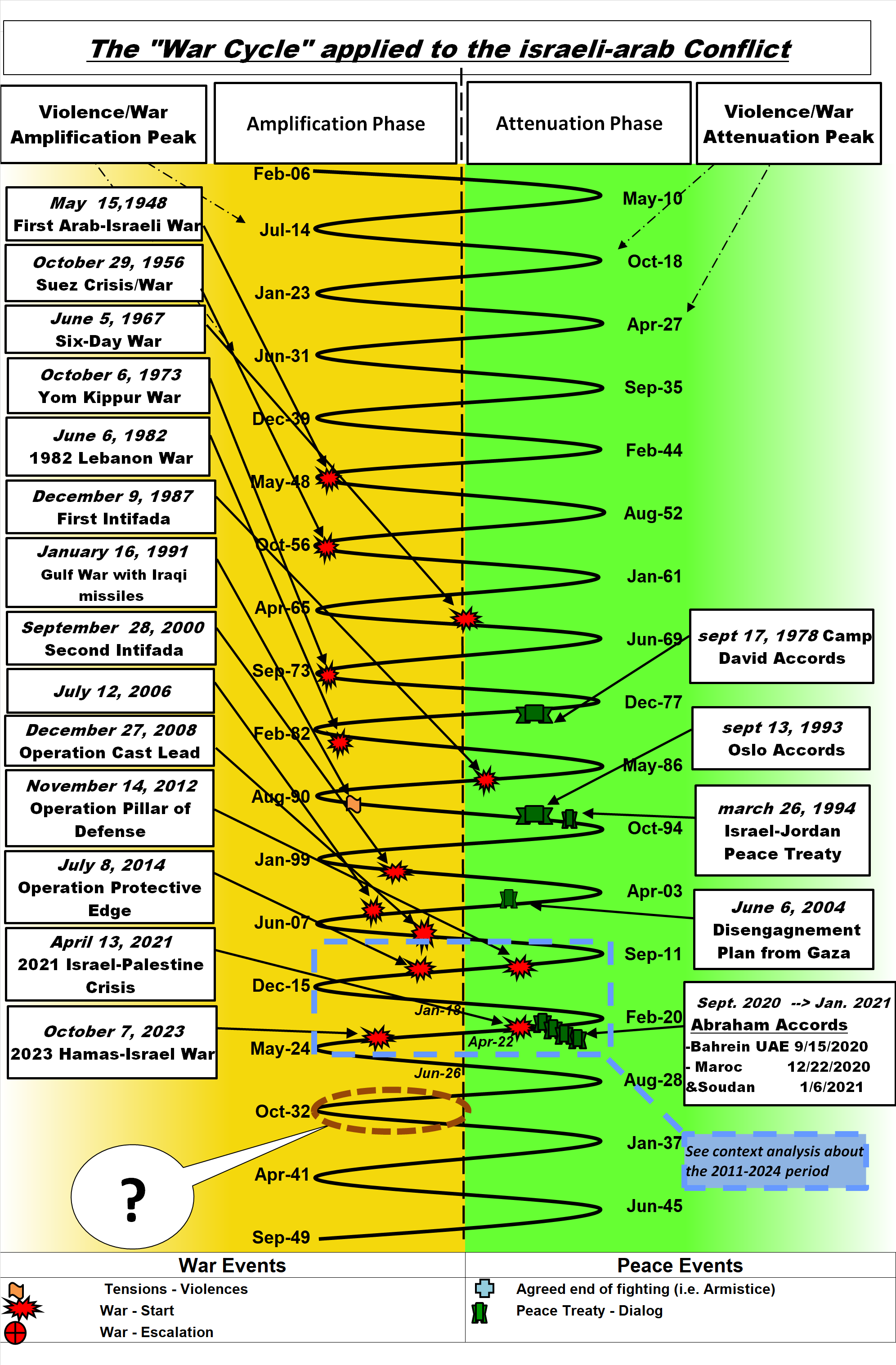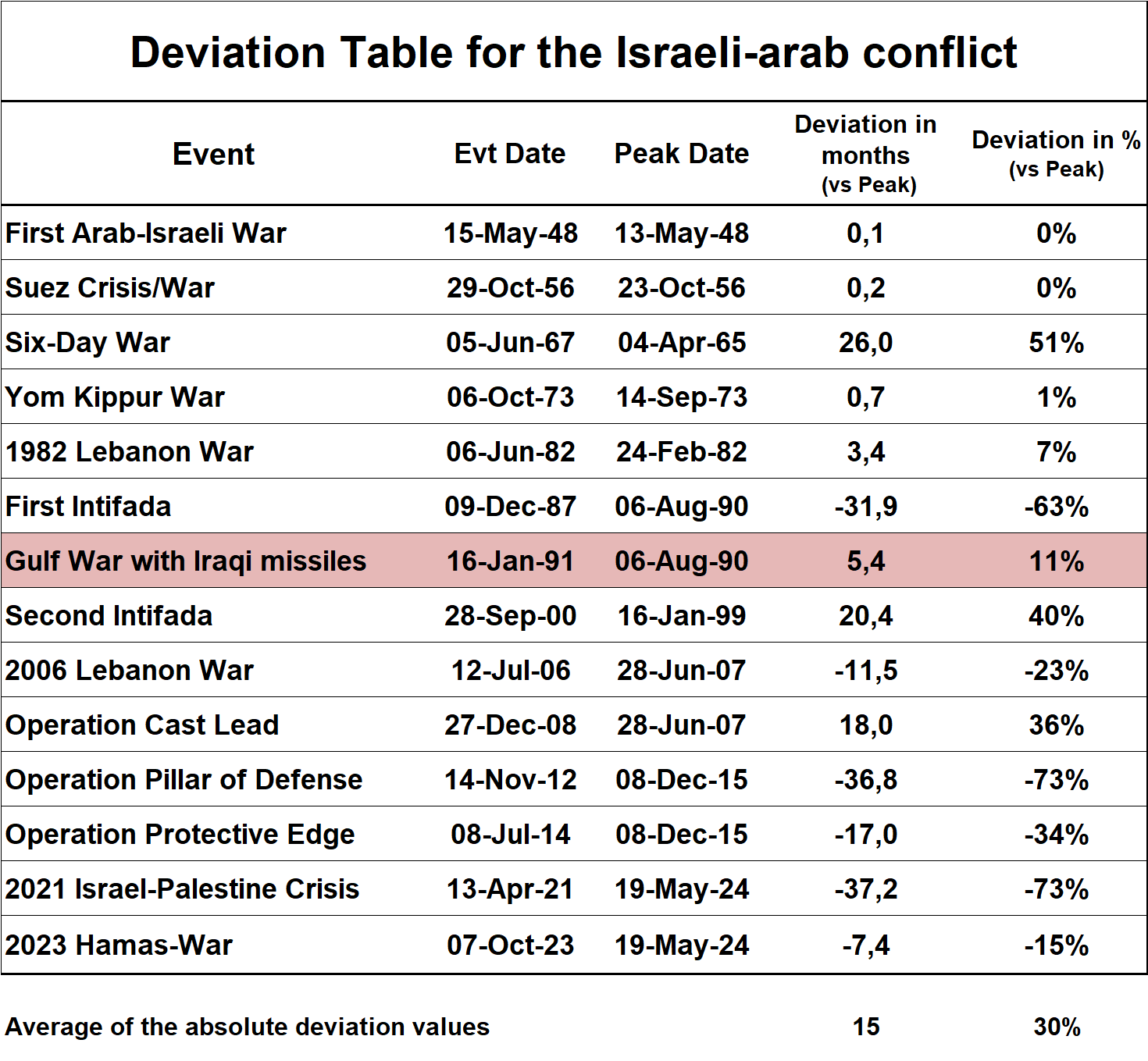It is important to read first the Methodology for presenting the “War Cycle” by context” in order to understand how the results are presented and what they mean
Analysis of the Arab-Israeli conflict based on contextual data
Place of the Arab-Israeli conflict in the “War Cycle”
Since the beginning of the “War Cycle”, the Arab-Israeli conflict has been the outstanding case, in both its war and peace aspects. Almost every amplification phase gives rise to a war, and every peace initiative takes place during an attenuation phase.
Until 2011, there was virtually no war during the attenuation phases. Since 2011, every amplification phase and every mitigation phase has resulted in an Israeli-Palestinian war. According to the methodology for presenting contexts, we should therefore consider the period 2011-2024 as not significant, since there are as many wars during the amplification phases (wars of 2014 and 2023) as during the attenuation phases (wars of 2012 and 2021). This would be true if the only criterion were the dates on which the wars were launched.
When we look at the Israeli-Palestinian wars of 2012, 2014, 2021 and 2023, we see that the number of war-related deaths in 2014 and 2023 (these 2 wars are during the amplification phases) is much higher than in the wars of 2012 and 2021 (these 2 wars are during the attenuation phases).
The “War Cycle” remains true, but we need to add other criteria to indicate the intensity of these wars. This is an evolution to be integrated into the overall study of the “War Cycle”. Demonstration by context and dates of outbreak must be complemented by other methods. The “materialization” demonstration method takes into account the number of deaths. This is a bit like what should be done with contexts: determine the intensity of wars based on the number of war victims, to identify “major” wars from “minor” ones.
The effect of the “War Cycle” on the Arab-Israeli conflict is still relevant today, even if it seems attenuated. We need to take into account the fact that wars are much stronger when they occur during phases of amplification.
This conflict is likely to lose its recurrent reality in the next 15 years, when the Arab world reconfigures itself regionally, with Israel then considered a regional state on a par with the other states of the Arab League. That time seems a long way off after the Hamas-Israel war of 2023. This war will generate more deaths in a single war than all previous wars from 1948 to 2022. Absolute carnage and horror compared to all the other wars in this conflict.
Forecasting
Forecasting future wars is fairly straightforward. There’s a 90% chance that the next amplification phase will result in war, as long as there’s no serious settlement. To know the outline of the war, all you have to do is keep in mind all the players still in conflict (Palestinians, Hezbollah, Iran and its allies, Syria) and accept any combination with these players, the worst being that they all go to war at the same time.
We need to take the time to understand the various wars and settlement attempts. Many settlement attempts that succeed during the attenuation phase are challenged during the amplification phase that follows. These challenges can be partial or lead to a deadlock in the settlement reached.
Until now, settlement attempts have taken place during the attenuation phases. Given the intensity of the 2023 war, it is likely that a settlement attempt will be relaunched before the end of the amplification phase from 2022 to 2026.
Even after a complete settlement, the “War Cycle” will have a muted effect for decades to come. Hopefully, it will simply provoke periods of tension rather than Wars.
Prospects for settlement
The Hamas massacres of October 7, 2023 have provoked a trauma equivalent to that of September 11, 2001 for Americans. There is no longer any reason for the Israeli military reactions that followed. More than 10,000 Palestinians dead for 1,400 Israelis. How many will die before the fighting is over? Several tens of thousands, probably. Even if Hamas were destroyed, that wouldn’t solve anything. It’s the future inspection and control system that will be key to the future of Gaza and a possible settlement.
This war of 2023 should re-launch a process to settle this conflict, but it will take several years to succeed.
updated November 16, 2023
The November 2023 update destroyed the forecast for a war in the 2022-2026 period. If you want to find the forecast made possible by the “War Cycle”, refer to an earlier version, such as War and Peace and the Cycle – FR – JBR – 2022-01-23 . In the Arab-Israeli conflict Context, you’ll find what was predicted.

